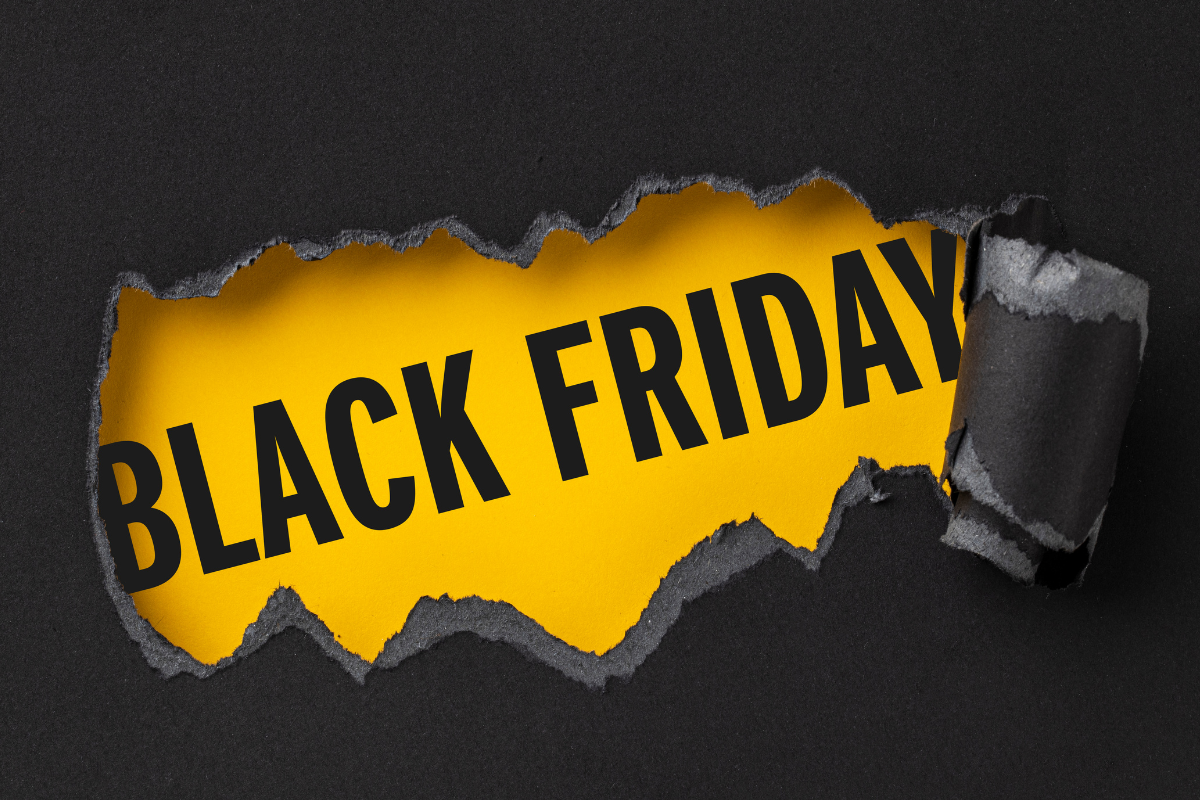Welcome to Life, Laughter, and Legacy Magazine! In this blog, we will take a deep dive into the evolution of Black Friday and explore how it has transformed from a simple day of bargain hunting to a chaotic and sometimes dangerous shopping frenzy. As one of the most highly anticipated shopping events of the year, Black Friday has a fascinating history that showcases the power of consumer culture and the impact it has on our society. Join us as we uncover the origins of this phenomenon and examine the effects it has on both retailers and shoppers alike. Get ready to uncover the truth behind the mass hysteria that surrounds Black Friday!
 Image by Eternal Creative
Image by Eternal Creative
The Origins of Black Friday
To truly understand the mass hysteria that surrounds Black Friday, we must first delve into its origins. The term "Black Friday" was initially used to describe a financial crisis in the late 1800s when the U.S. gold market crashed. However, it wasn't until the 1950s that the term took on a different meaning.
In Philadelphia, police officers used the term to describe the chaos and congestion that occurred the day after Thanksgiving. The city saw an influx of suburban shoppers and football fans, creating heavy traffic and crowded sidewalks. Retailers soon realized they could capitalize on this and began offering special sales and promotions to attract shoppers.
Over time, the concept spread across the country. As the tradition grew, retailers started opening their doors earlier and earlier, turning Black Friday into a holiday shopping event that was eagerly awaited by consumers all over the nation.
 Image by Ipopba from Getty Images Pro
Image by Ipopba from Getty Images Pro
The Rise of Black Friday as a Shopping Phenomenon
With each passing year, Black Friday grew in popularity and became a highly anticipated event for both retailers and consumers. As word spread about the incredible deals and savings available on this day, more and more people flocked to stores in search of bargains.
The rise of the internet played a significant role in the expansion of Black Friday. Consumers no longer had to brave the crowds and long lines; they could simply browse the online sales from the comfort of their own homes. This shift to online shopping gave rise to Cyber Monday, where retailers offered exclusive deals and discounts specifically for online shoppers.
Retailers also began to recognize the importance of marketing and advertising during the Black Friday season. Advertisements flooded television screens, newspapers, and the internet, all vying for the attention of consumers. The competition among retailers became fierce, with each one striving to offer the most attractive discounts and promotions.
In response to the growing demand, many stores started opening their doors at midnight, allowing shoppers to begin their bargain hunting even earlier. This decision led to a shift in the traditional Thanksgiving celebrations, as some families chose to cut their festivities short to ensure they wouldn't miss out on the best deals.
As Black Friday became more and more ingrained in American culture, it became a symbol of consumerism and excess. Stories of stampedes, fights, and even injuries during shopping frenzies started making headlines. The once peaceful day of bargain hunting had now transformed into an intense and chaotic spectacle.
 Image by Art Marie
Image by Art Marie
The Impact on Businesses and Consumers
As Black Friday continued to grow in popularity, its impact on businesses and consumers became more evident. For retailers, this shopping extravaganza offered a chance to boost sales and maximize profits. The intense competition among retailers forced them to offer deeper discounts and more attractive promotions to capture the attention and wallets of consumers.
On the other hand, consumers eagerly awaited this day to snag the best deals and savings. However, as the hype around Black Friday increased, so did the pressure on consumers to participate. Many people felt compelled to join the frenzy and secure their desired items before they sold out. This created a sense of urgency and even a fear of missing out.
Furthermore, the increasing popularity of online shopping had a profound impact on both retailers and consumers during the Black Friday season. With the convenience of browsing and purchasing products from the comfort of their homes, consumers no longer had to endure long lines or crowded stores. Online sales became a significant part of Black Friday, with retailers offering exclusive deals and discounts specifically for online shoppers.
This shift to online shopping also allowed retailers to reach a broader audience and extend the duration of their sales. Instead of being confined to just one day, many retailers started offering pre-Black Friday sales and Cyber Monday deals, effectively turning Black Friday into a week-long shopping event.
Black Friday's evolution from a simple day of bargain hunting to a frenzied shopping extravaganza has had a profound impact on both businesses and consumers. The intense competition among retailers, the pressure on consumers to participate, and the rise of online shopping have all shaped and transformed this shopping phenomenon.
 Image by Shop Wrenée™
Image by Shop Wrenée™
The Shift Towards Online Shopping
With the rise of technology and the increasing popularity of online shopping, it's no surprise that Black Friday has also undergone a significant shift towards the digital realm. In recent years, online shopping has become a prominent and influential aspect of the Black Friday shopping experience.
One of the major advantages of online shopping during Black Friday is the convenience it offers consumers. Gone are the days of waiting in long lines and battling the crowds at brick-and-mortar stores. Instead, shoppers can browse and purchase products from the comfort of their own homes. This eliminates the stress of dealing with overcrowded stores and allows customers to take their time making purchasing decisions.
Online shopping during Black Friday also presents consumers with a wider range of options. Retailers are no longer limited by physical store space, meaning they can offer a larger inventory and a broader selection of products. This allows shoppers to find exactly what they're looking for without having to settle for second-best or compromise on their preferences.
In addition, online retailers often provide exclusive deals and discounts specifically for Black Friday shoppers. These online-only offers can sometimes be even more enticing than what is available in-store, further incentivizing consumers to make their purchases online. From free shipping to special promo codes, online retailers are constantly finding ways to attract and retain customers during the Black Friday shopping season.
For businesses, the shift towards online shopping has also provided numerous opportunities for growth and increased sales. By expanding their online presence, retailers can reach a broader audience and tap into markets that may not be accessible through physical store locations. Online sales have the potential to extend beyond just one day, as retailers now offer pre-Black Friday deals and Cyber Monday specials, creating a week-long shopping extravaganza.
 Image by Pressmaster
Image by Pressmaster
Controversies Surrounding Black Friday
While Black Friday may be synonymous with great deals and excitement for many consumers, it is not without its fair share of controversies. With the frenzy and mass hysteria that this shopping event generates, there have been instances of unruly crowds and even violence at some physical retail locations.
Year after year, news headlines showcase incidents of stampedes, fights, and injuries as shoppers push and shove their way to get their hands on the best deals. These incidents not only pose a safety risk but also raise ethical concerns about the value we place on material possessions and the lengths we are willing to go to acquire them.
Moreover, the pressure to get the best deals has led to a phenomenon known as "doorbusters." Retailers offer deep discounts on a limited number of items to entice customers to their stores. However, this practice often creates a sense of urgency and competition among shoppers, further fueling the frenzy and potentially resulting in disappointment and frustration.
Another controversy surrounding Black Friday is the toll it takes on retail workers. Many employees are required to work long hours, sometimes overnight, to accommodate the influx of shoppers. This can be physically and mentally exhausting, leading to burnout and sacrificing quality time with families during the Thanksgiving holiday.
 Image by FabrikaCr from Getty Images
Image by FabrikaCr from Getty Images
The Future of Black Friday
As we reflect on the evolution of Black Friday and all its controversies, it begs the question: what does the future hold for this shopping phenomenon? With the rise of online shopping and the increasing popularity of Cyber Monday, some experts believe that the traditional image of Black Friday may eventually fade away.
In recent years, we have witnessed a shift in consumer behavior as more people turn to the convenience of online shopping. E-commerce giants like Amazon have capitalized on this trend by offering their own version of Black Friday deals, enticing consumers to stay home and shop from their devices.
Additionally, the ongoing COVID-19 pandemic has accelerated the adoption of online shopping even further, with many consumers preferring the safety and convenience of virtual deals in overcrowded stores.
While physical retail locations may still see some foot traffic on Black Friday, it is likely that the overall frenzy and mass hysteria will continue to diminish. As we enter a new era of consumer behavior, it will be interesting to see how retailers adapt to these changes and find innovative ways to capture the attention and wallets of shoppers.
In conclusion, the future of Black Friday appears to be shifting towards the digital realm. The rise of online shopping and the growing popularity of Cyber Monday are challenging the traditional image of this frenzied shopping event. E-commerce giants like Amazon have already embraced this change, offering their own version of Black Friday deals online.
Moving forward, it will be crucial for retailers to adapt and find innovative ways to capture the attention and wallets of shoppers. Technology will likely play a significant role in shaping the future of Black Friday, with emerging trends such as virtual reality shopping experiences and personalized online recommendations redefining the shopping event.

